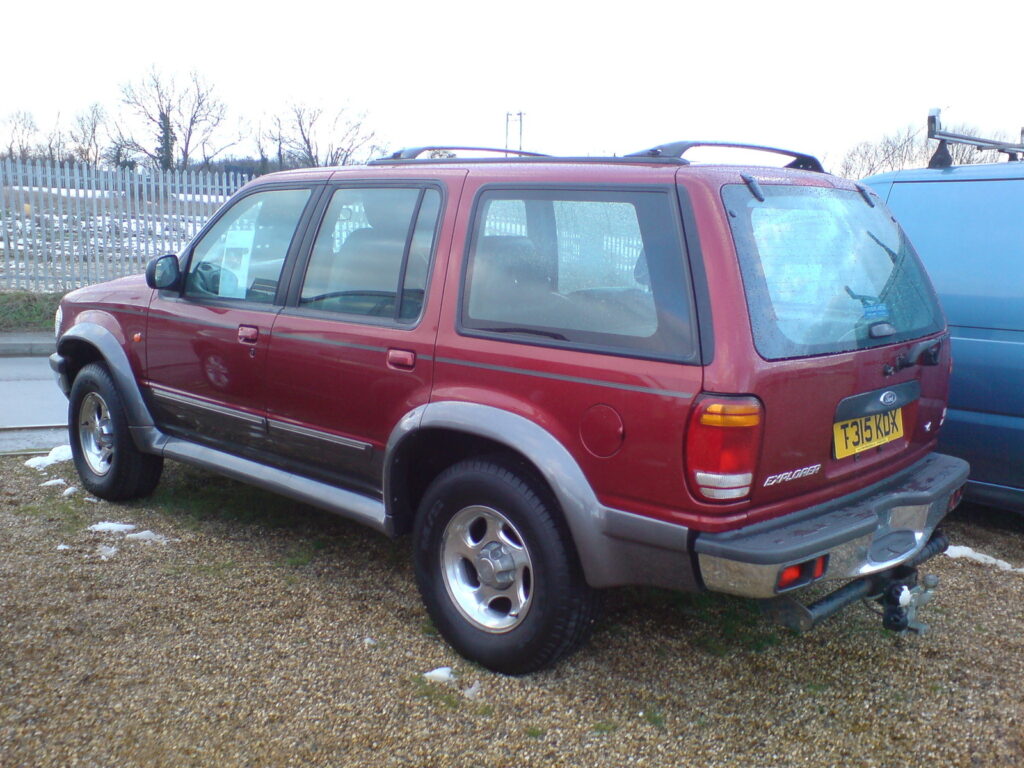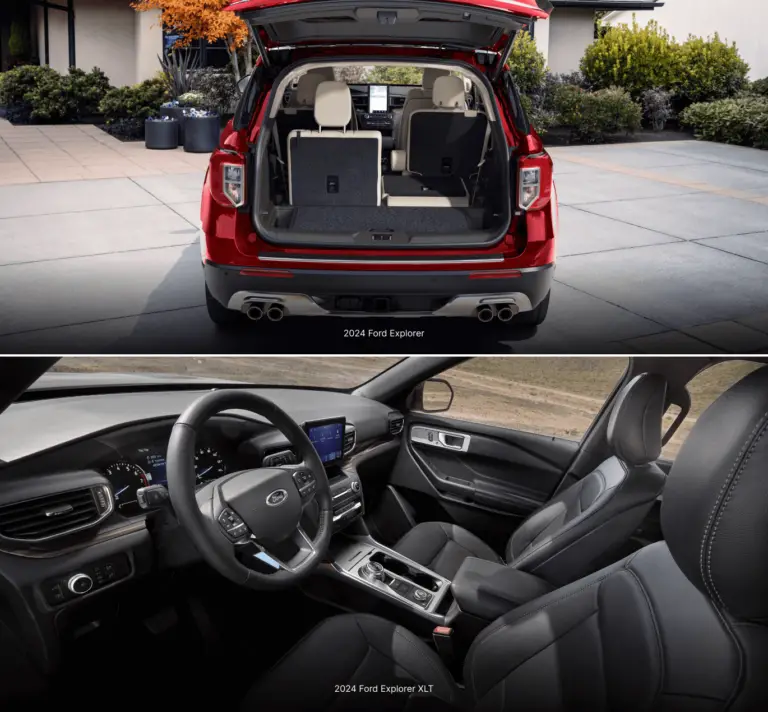The 1998 Ford Explorer is a reliable SUV known for its durability and off-road capabilities. With a spacious interior and powerful engine options, it is a popular choice among SUV enthusiasts.
The classic design and robust build of the 1998 Ford Explorer make it a timeless vehicle that continues to attract drivers seeking adventure and practicality. This iconic SUV has stood the test of time, offering a blend of ruggedness and comfort that appeals to a wide range of drivers.
Whether navigating city streets or tackling rough terrain, the 1998 Ford Explorer delivers a reliable and versatile driving experience. Its reputation for durability and performance has earned it a loyal following, making it a sought-after vehicle in the SUV market.
Regular Maintenance
Regular maintenance for a 1998 Ford Explorer is essential to ensure optimal performance and longevity. Keeping up with routine checks and servicing can help prevent costly repairs down the line, maintaining the vehicle’s reliability and safety on the road.
Regular Maintenance It is essential to maintain your 1998 Ford Explorer to ensure its longevity and performance.
Fluid Checks
Regularly check the fluids in your Ford Explorer such as oil, coolant, and brake fluid.
Tire Inspection
Perform routine tire inspections to check for tire pressure, tread wear, and overall condition.
Filter Replacements
Replace air, oil, and fuel filters at recommended intervals to keep your engine running smoothly.
Engine Care
Properly maintaining the engine of your 1998 Ford Explorer is crucial for its longevity and performance. By following a routine maintenance schedule, you can ensure that your SUV runs smoothly for years to come.
Oil Changes
Regular oil changes are essential to keep your engine lubricated and prevent damage. Change the oil every 5,000 miles to maintain optimal performance.
Spark Plug Replacement
Replacing spark plugs regularly helps maintain fuel efficiency and smooth engine operation. Change spark plugs every 30,000 miles for best results.
Air Intake Cleaning
Cleaning the air intake removes dirt and debris that can clog the engine. Perform air intake cleaning annually to ensure proper air flow.
Transmission
If you own a 1998 Ford Explorer, you know that the transmission is a vital component that keeps your vehicle running smoothly. The transmission is responsible for transferring power from the engine to the wheels, allowing you to shift gears and control your speed. In this post, we will discuss three important aspects of the transmission: fluid flush, transmission filter replacement, and torque converter check. These maintenance tasks are essential to ensure the longevity and optimal performance of your Ford Explorer.
Fluid Flush
One of the most crucial maintenance tasks for your 1998 Ford Explorer’s transmission is a fluid flush. Over time, the transmission fluid can become contaminated with dirt, debris, and other contaminants. This can lead to inefficient performance and potential damage to the transmission system itself. To prevent this, it is recommended to flush the old transmission fluid and replace it with fresh fluid at regular intervals, typically every 30,000 to 60,000 miles.
A fluid flush involves draining the old transmission fluid from the system and replacing it with new fluid. This process helps to remove any contaminants that may have built up over time, ensuring smooth operation and preventing potential issues. It is important to consult your vehicle’s manual or a professional mechanic for the specific fluid type and quantity required for your 1998 Ford Explorer.
Transmission Filter Replacement
In addition to a fluid flush, replacing the transmission filter is also essential for maintaining the health of the transmission. The filter is responsible for removing any particles or debris that may be present in the transmission fluid. Over time, the filter can become clogged, affecting the flow of fluid and potentially causing damage to the transmission system.
To replace the transmission filter, the transmission pan needs to be removed, and the old filter needs to be swapped out for a new one. It is recommended to perform this maintenance task during a fluid flush, as the pan will already be accessible. By regularly replacing the transmission filter, you can ensure that the fluid remains clean and the transmission operates efficiently.
Torque Converter Check
The torque converter plays a crucial role in the operation of your 1998 Ford Explorer’s transmission. It serves as a connection between the engine and the transmission, allowing smooth and seamless power transfer. Over time, the torque converter can experience issues such as leaks, slipping, or overheating, which can affect the performance and efficiency of the transmission.
A torque converter check involves inspecting the torque converter for any signs of damage or wear. This can include checking for leaks, examining the fluid for any discoloration or debris, and ensuring the torque converter is properly engaged with the engine. If any issues are identified, it is important to address them promptly to prevent further damage to the transmission system.
In conclusion, taking care of your 1998 Ford Explorer’s transmission is crucial for maintaining its performance and longevity. By performing regular maintenance tasks such as fluid flushes, transmission filter replacements, and torque converter checks, you can keep your vehicle running smoothly and prevent costly repairs in the future.

Credit: www.ebay.com
Brake System
The brake system in the 1998 Ford Explorer is a critical component for the vehicle’s safety and performance. Keeping the brakes in top condition is essential for ensuring safe driving experiences. Here are the key aspects of the brake system that every Explorer owner should be aware of:
Brake Pad Inspection
The brake pads in the 1998 Ford Explorer are crucial for safe and efficient braking. It’s important to regularly inspect the brake pads for wear and tear to maintain optimal braking performance. Signs of worn brake pads include squealing noises, reduced braking power, and uneven braking. Regular visual checks and measurements can help in identifying when brake pad replacement is necessary.
Brake Fluid Replacement
The brake fluid in the 1998 Ford Explorer plays a crucial role in transmitting force from the brake pedal to the brake calipers. Over time, brake fluid can become contaminated or degraded, compromising the brake system’s effectiveness. Regular brake fluid replacement ensures the brake hydraulic system remains in optimal condition. It’s essential to follow the manufacturer’s recommendations for the type of brake fluid and the interval for fluid replacement to maintain reliable brake performance.
Rotor Resurfacing
The brake rotors in the 1998 Ford Explorer are subjected to intense heat and friction during braking, leading to wear and surface irregularities. Rotor resurfacing can help restore smooth braking performance by removing imperfections from the rotor’s surface. This process involves machining the rotor’s surface to ensure it’s flat and free from grooves or warping. Regular rotor resurfacing can extend the brake rotor lifespan and prevent issues such as pulsating brakes and excessive noise during braking.
Suspension & Steering
When it comes to the performance and safety of your 1998 Ford Explorer, paying attention to the suspension and steering is crucial. Proper maintenance of these components ensures a smooth and stable ride, as well as responsive handling. In this section, we’ll delve into the essential aspects of suspension and steering maintenance for your Ford Explorer.
Shock And Strut Inspection
Regular inspection of the shocks and struts is essential to ensure your Explorer’s suspension system is functioning optimally. Over time, these components can experience wear and tear, affecting the vehicle’s stability and ride comfort. You can visually inspect them for signs of leaks, dents, or visible damage. Additionally, a professional inspection can help identify any underlying issues that may compromise your Explorer’s suspension performance.
Power Steering Fluid Flush
Maintaining a healthy power steering system is integral for responsive and effortless steering. A periodic power steering fluid flush helps remove contaminants and debris that can affect the system’s performance. By ensuring clean and adequate fluid levels, you can optimize your Explorer’s steering responsiveness and overall driving experience.
Wheel Alignment
Proper wheel alignment is crucial for maintaining even tire wear and preventing steering issues. Over time, your Explorer’s wheels can become misaligned due to factors such as driving over potholes or hitting curbs. Periodic wheel alignment ensures that the wheels are properly angled, promoting optimal handling and stability on the road.
Electrical Systems
In the realm of vehicles, electrical systems play a crucial role in ensuring proper functioning and overall performance. The electrical system of a car is responsible for powering various components, such as lights, audio systems, and crucially, the engine itself. The 1998 Ford Explorer, a popular SUV from its time, also relied on a robust electrical system to deliver optimal driving experiences. In this blog post, we will explore three important aspects of the electrical system in the 1998 Ford Explorer: battery maintenance, alternator testing, and fuse and wiring check.
Battery Maintenance
The battery in your 1998 Ford Explorer is the heart of its electrical system, providing the initial power to start the engine. Regular battery maintenance is essential to ensure smooth performance and avoid unexpected breakdowns. Here are a few tips for maintaining your Ford Explorer’s battery:
- Check the battery terminals for any corrosion. Use a battery cleaning brush to remove any buildup.
- Inspect the battery case for any signs of damage or leakage. Replace the battery if necessary.
- Ensure that the battery is securely fastened in place to prevent unnecessary vibrations.
- Perform regular voltage checks to monitor the battery’s health. If the voltage drops below the recommended level, consider replacing the battery.
- Keep the battery clean and free from dirt and debris. Wipe it down regularly using a damp cloth.
- If you’re storing your 1998 Ford Explorer for an extended period, consider disconnecting the battery to prevent drainage.
Alternator Testing
The alternator plays a vital role in charging the battery and providing power to the electrical components of your 1998 Ford Explorer. Testing the alternator’s functionality is crucial to ensure that it is working optimally. Here’s how you can test the alternator:
- Start the engine and let it idle for a few minutes.
- Turn on various electrical components, such as headlights, radio, and air conditioning, to put a load on the alternator.
- Using a multimeter, connect it to the battery terminals and check the voltage output. A healthy alternator should show a voltage reading within the manufacturer’s recommended range.
- If you observe a significantly low or high reading, it indicates a potential issue with the alternator, and it is advisable to consult a professional mechanic for further inspection.
Fuse And Wiring Check
The fuse and wiring system in your 1998 Ford Explorer protects the electrical components from excessive current and prevents electrical damage. Regularly checking the fuses and wiring ensures uninterrupted electrical supply. Here’s how you can perform a fuse and wiring check:
- Locate the fuse box, typically located under the dashboard or in the engine compartment.
- Refer to the owner’s manual to identify the specific fuses corresponding to each electrical component.
- Inspect each fuse to ensure they are intact. Replace any blown fuses with a new one of the appropriate amperage rating.
- Visually inspect the wiring for any signs of damage, such as frayed or exposed wires. If any issues are found, it is advisable to consult a professional mechanic for repairs or replacements.
By prioritizing battery maintenance, conducting regular alternator testing, and performing fuse and wiring checks, you can ensure that the electrical system of your 1998 Ford Explorer remains in optimal condition, providing you with a pleasant and reliable driving experience.
Exterior Care
When it comes to maintaining the beauty and longevity of your 1998 Ford Explorer, proper exterior care is essential. From protecting the paint to ensuring clear headlights, these simple maintenance tasks can keep your vehicle looking its best.
Paint Protection
Applying a layer of wax twice a year can help protect your Explorer’s paint from fading and environmental damage.
Washing And Waxing
Regularly washing your vehicle with a mild soap and soft sponge can prevent dirt buildup and rust formation. Follow up with a wax for added protection.
Headlight Restoration
Cloudy headlights not only affect visibility but also reduce the overall appearance of your Explorer. Consider using a headlight restoration kit to improve clarity.

Credit: www.amazon.com
Frequently Asked Questions On 1998 Ford Explorer
What Are Common Issues With the 1998 Ford Explorer?
The 1998 Ford Explorer may experience transmission problems, rust, and electrical issues over time.
How Can I Improve Fuel Efficiency In My 1998 Ford Explorer?
To improve fuel efficiency in your 1998 Ford Explorer, ensure regular maintenance, proper tire pressure, and smooth driving habits.
What Safety Features Does The 1998 Ford Explorer Have?
The 1998 Ford Explorer is equipped with standard safety features such as dual front airbags and 4-wheel ABS brakes.
What Is The Towing Capacity Of A 1998 Ford Explorer?
The towing capacity of a 1998 Ford Explorer ranges from 3,500 to 5,600 pounds depending on the drivetrain and engine type.
Conclusion
The 1998 Ford Explorer offers an impressive blend of durability, versatility, and performance. Its powerful engine, rugged design, and comfortable interior make it an ideal choice for both city driving and off-road adventures. With its reliability and timeless appeal, this iconic SUV continues to be a popular option for those seeking a reliable and durable vehicle.
Discover the enduring legacy of the 1998 Ford Explorer and experience the excitement it brings on any journey.







One Response